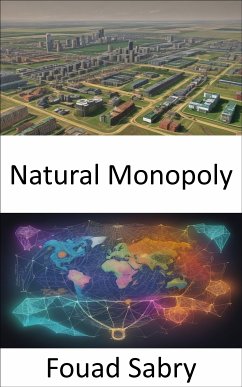What is Natural Monopoly
A natural monopoly is a monopoly in an industry in which high infrastructural costs and other barriers to entry relative to the size of the market give the largest supplier in an industry, often the first supplier in a market, an overwhelming advantage over potential competitors. Specifically, an industry is a natural monopoly if the total cost of one firm, producing the total output, is lower than the total cost of two or more firms producing the entire production. In that case, it is very probable that a company (monopoly) or minimal number of companies (oligopoly) will form, providing all or most relevant products and/or services. This frequently occurs in industries where capital costs predominate, creating large economies of scale about the size of the market; examples include public utilities such as water services, electricity, telecommunications, mail, etc. Natural monopolies were recognized as potential sources of market failure as early as the 19th century; John Stuart Mill advocated government regulation to make them serve the public good.
How you will benefit
(I) Insights, and validations about the following topics:
Chapter 1: Natural monopoly
Chapter 2: Economies of scale
Chapter 3: Microeconomics
Chapter 4: Monopoly
Chapter 5: Monopolistic competition
Chapter 6: Perfect competition
Chapter 7: Imperfect competition
Chapter 8: Public utility
Chapter 9: Economies of scope
Chapter 10: X-inefficiency
Chapter 11: Anti-competitive practices
Chapter 12: Barriers to entry
Chapter 13: Monopoly profit
Chapter 14: Average cost
Chapter 15: Contestable market
Chapter 16: Market power
Chapter 17: Free entry
Chapter 18: Competition (economics)
Chapter 19: Rate-of-return regulation
Chapter 20: Minimum efficient scale
Chapter 21: History of microeconomics
(II) Answering the public top questions about natural monopoly.
(III) Real world examples for the usage of natural monopoly in many fields.
Who this book is for
Professionals, undergraduate and graduate students, enthusiasts, hobbyists, and those who want to go beyond basic knowledge or information for any kind of Natural Monopoly.
A natural monopoly is a monopoly in an industry in which high infrastructural costs and other barriers to entry relative to the size of the market give the largest supplier in an industry, often the first supplier in a market, an overwhelming advantage over potential competitors. Specifically, an industry is a natural monopoly if the total cost of one firm, producing the total output, is lower than the total cost of two or more firms producing the entire production. In that case, it is very probable that a company (monopoly) or minimal number of companies (oligopoly) will form, providing all or most relevant products and/or services. This frequently occurs in industries where capital costs predominate, creating large economies of scale about the size of the market; examples include public utilities such as water services, electricity, telecommunications, mail, etc. Natural monopolies were recognized as potential sources of market failure as early as the 19th century; John Stuart Mill advocated government regulation to make them serve the public good.
How you will benefit
(I) Insights, and validations about the following topics:
Chapter 1: Natural monopoly
Chapter 2: Economies of scale
Chapter 3: Microeconomics
Chapter 4: Monopoly
Chapter 5: Monopolistic competition
Chapter 6: Perfect competition
Chapter 7: Imperfect competition
Chapter 8: Public utility
Chapter 9: Economies of scope
Chapter 10: X-inefficiency
Chapter 11: Anti-competitive practices
Chapter 12: Barriers to entry
Chapter 13: Monopoly profit
Chapter 14: Average cost
Chapter 15: Contestable market
Chapter 16: Market power
Chapter 17: Free entry
Chapter 18: Competition (economics)
Chapter 19: Rate-of-return regulation
Chapter 20: Minimum efficient scale
Chapter 21: History of microeconomics
(II) Answering the public top questions about natural monopoly.
(III) Real world examples for the usage of natural monopoly in many fields.
Who this book is for
Professionals, undergraduate and graduate students, enthusiasts, hobbyists, and those who want to go beyond basic knowledge or information for any kind of Natural Monopoly.
Dieser Download kann aus rechtlichen Gründen nur mit Rechnungsadresse in A, B, BG, CY, CZ, D, DK, EW, E, FIN, F, GR, H, IRL, I, LT, L, LR, M, NL, PL, P, R, S, SLO, SK ausgeliefert werden.









